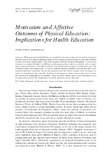| dc.contributor.author | Reppa, Glykeria | |
| dc.date.accessioned | 2021-04-13T07:16:24Z | |
| dc.date.available | 2021-04-13T07:16:24Z | |
| dc.date.issued | 2007-09 | |
| dc.identifier.uri | http://hdl.handle.net/11728/11883 | |
| dc.description.abstract | Enjoyment and mood affection are considered to be main targets of intervention to promote
physical activity (PA). Health education based on PA is seeking to explore the factors that affect children
to foster and retain healthy habits. This study recognizes that the teaching methodology is crucial and
attempts to investigate the effect two different teaching approaches on affective variables, such as, enjoyment, mood and intention. The indirect method (“The Guided Discovery Style”) and the direct one (“The
Command Style”) were implemented. A two way repeated measures ANOVA indicated that there is statistically significant interaction between the enjoyment and the indirect method, while the impact on
mood was insignificant but noticeable. Intention to participate in similar lessons after school curriculum found to be independent of the methods. Thus, the direct method seems to have the potential of a
powerful tool to promote PA. Implications for health education are also discussed. | en_UK |
| dc.language.iso | en | en_UK |
| dc.relation.ispartofseries | Science Education International;Vol. 18, No. 3, September 2007, pp. 217-233 | |
| dc.rights.uri | http://creativecommons.org/licenses/by-nc-nd/4.0/ | en_UK |
| dc.subject | Enjoyment | en_UK |
| dc.subject | health education | en_UK |
| dc.subject | mood | en_UK |
| dc.subject | motivation | en_UK |
| dc.subject | teaching methods | en_UK |
| dc.subject | physical education | en_UK |
| dc.title | Motivation and Affective Outcomes of Physical Education: Implications for Health Education | en_UK |
| dc.type | Article | en_UK |


